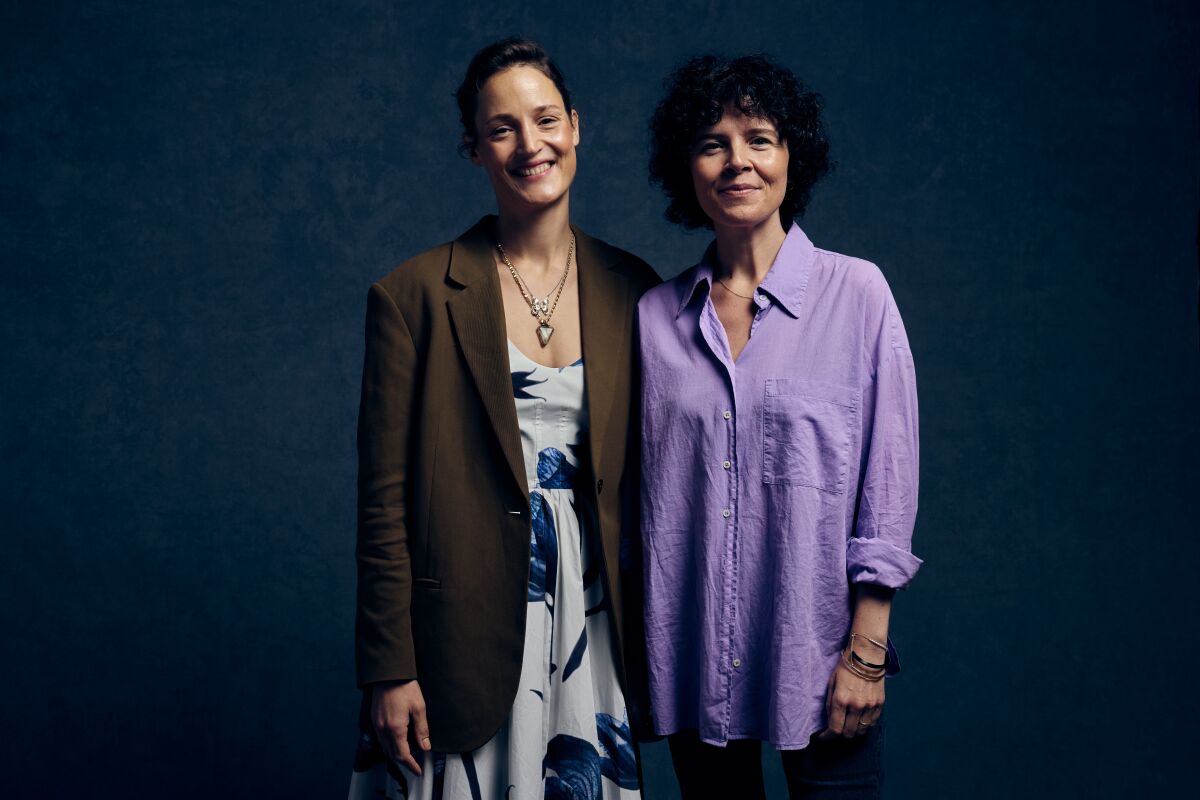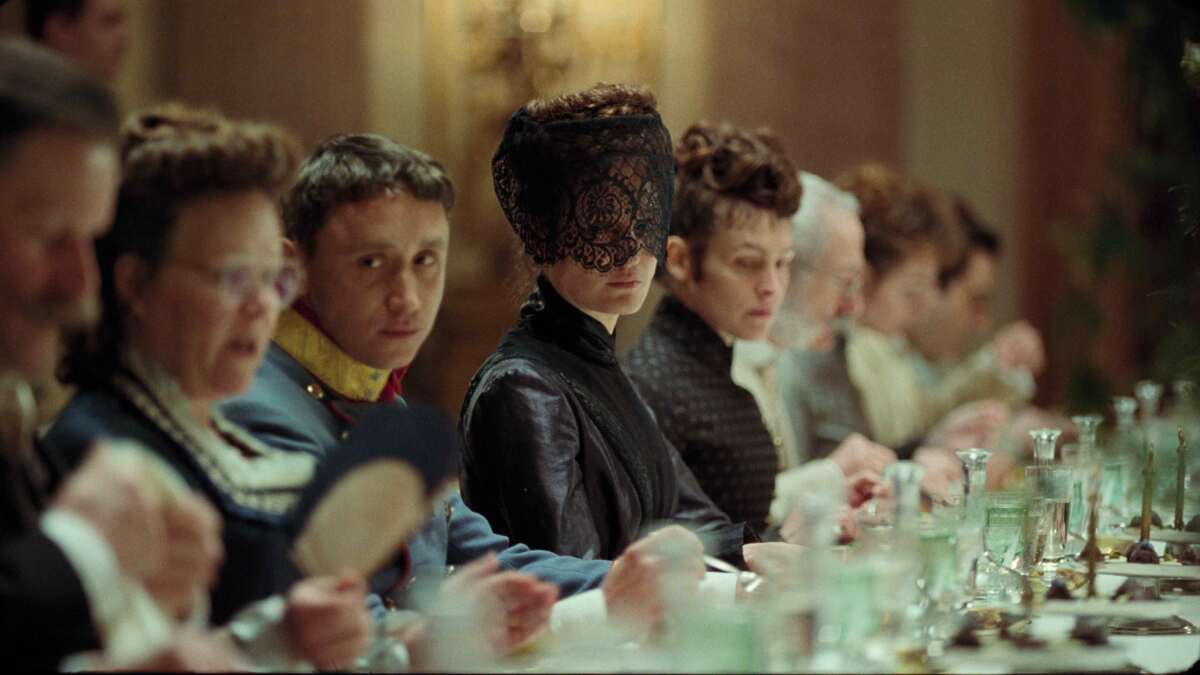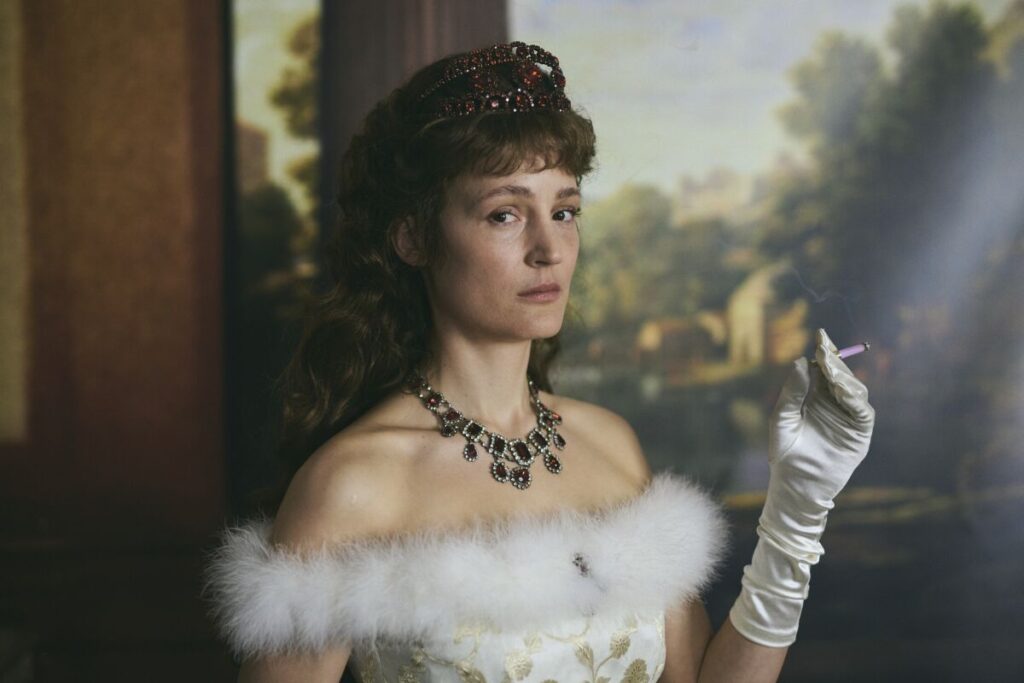Vicky Krieps brings a sense of spontaneity and live-wire unpredictability to every role she plays, from her breakout performance in Paul Thomas Anderson’s “Phantom Thread” opposite Daniel Day-Lewis to her new, celebrated part in Marie Kreutzer’s “Corsage.”
Krieps won a prize for her performance when “Corsage” premiered in the Un Certain Regard section of the 2022 Cannes Film Festival. The movie would go on to be named best picture at the London Film Festival. Krieps also won for her performance at the European Film Awards, where the movie was nominated for best European film and Kreutzer was nominated for directing.
In the picture, which opens Friday in Los Angeles, Krieps plays Empress Elisabeth of Austria, known by the nickname “Sisi,” as she celebrates her 40th birthday in 1877. Though she is widely known for her public image, she is given little to do, as her husband, Emperor Franz Joseph (Florian Teichtmeister), allows her to participate only in ceremonial duties. She begins to rebel in ways big and small, pushing back against the expectations of her times as to what the life of a woman can be.
Born in Luxembourg and based in Berlin, the 39-year-old Krieps does not seem like someone to be kept idly aside, approaching her life and career with a bohemian spirit all her own. During a recent interview in Los Angeles, after being asked a question regarding how her new movie relates to history, Krieps reached into her bag for a book she had just been reading, Anne Cameron’s “Daughters of Copper Woman.” As she shuffled through the pages to find a passage related to the topic at hand, Krieps noted, “I’m not part of the fast-moving world.”
Aside from “Phantom Thread,” Krieps has also had standout performances in films such as Mia Hansen-Løve’s “Bergman Island,” M. Night Shyamalan’s “Old” and Mathieu Amalric’s “Hold Me Tight.” She previously appeared in Kretuzer’s 2016 film “We Used to Be Cool,” which led to the two of them wanting to work together again.
Perhaps the only expectation to have for Krieps moving forward is surprise. Transforming a historical tale into an energetic exploration of rebellion with “Corsage,” Krieps has found a project perfectly suited to her own style. Or, to use her description of the film, “my personal private answer to what it means being a woman and being an actress.”
Vicky Krieps as Empress Elisabeth of Austria in “Corsage.”
(Felix Vratny / IFC Films)
The project really originated with you. You suggested the idea to Marie Kreutzer. You’ve talked about how you first learned of the story of Empress Elisabeth when you were 15 or so. What made you interested in visiting her story now?
I think a lot of it was intuition, but if I look at it now, I know what it was. I could feel in the story of this woman some sort of melancholia or depression or sadness coming from something we all have today a lot, which is alienation from yourself. We’ve come to the point in our society where we’ve moved away from love so far that we don’t even know who we are. We have no relation to our bodies. We have no relation to our sexuality, to who we are, especially women. For hundreds of years, women were taught to behave and to hide everything that was female and hide their sexuality and hide their emotions, that having your period is filthy or something; you have to behave as if you were sick.
Even I, who grew up in this hippie house where everyone was free and my mother taught me to climb on trees, still, going to school, society taught me that I had to please, that I had to be pretty, that I had to be OK if someone grabs my ass, because that’s just what it is. And I never felt OK with any of it. And I think not feeling OK with it made me feel close to her in some sort of struggle that I didn’t understand at the time. But now I do.
From very early in the film, people are criticizing Elisabeth about how she looks and about her weight. Especially as an actor, did you come to connect with those aspects of her story?
I knew how obsessed she was with these things, like her weight and the riding and the fitness instruments. But I remember thinking, “Why was this woman like that? Why was she doing this?” And that started me being curious, but I really found out more doing the research. And that’s something that happened in two stages, because one was, like everything in my life, more intuitive. Then I came here to show and present and do Q&As for “Phantom Thread.” And when I came back from doing that, I was very confused.
I didn’t know what happened. People were talking about me. And that’s so weird. So I went home and that’s when I had the script in my inbox and I thought, “Now, I can really understand her, what it means when people look at you,” even if it’s in a completely different scale. At 16, they would hand out little hand-drawn pictures of her, which is like the old-school Instagram. They would hand them out and say, “This is the most beautiful woman of Europe.” It must have been traumatizing. Everyone knew her and knew how she looked and said that she’s the most beautiful, which then, she had to answer to.

Vickie Krieps, left star of “Corsage,” and the film’s director, Marie Kreutzer.
(Kent Nishimura / Los Angeles Times)
When you proposed the idea to Marie of doing an Empress Elisabeth movie, she didn’t want to do it at first. What changed her mind?
I couldn’t convince her at first. She grew up in Austria and there, Sisi is pure merchandise. She’s on every cup, on every tote bag, on every piece of cake. So to her it was the most shallow, stupid, superficial thing you could ever do as a woman. And she was like, “Oh, no.” And then we parted ways and secretly, without telling me, she went to the archive. And she would read about her and these little acts of rebellion. Like, she would go to eat dinner and sit down but not eat. Or she would smoke, which at the time was absolutely not allowed for women to do.
And all these things may seem small, but for the time, it was rebellious to do that. And that’s what she found in the archives, wrote a script and sent to me. And with the hard copy of the script was a postcard that said, “Well, I guess you were right.”
You mentioned “Phantom Thread,” and you’ve been really open talking about the fact that you purposefully stepped back from the Hollywood career that was being offered you after the success of that film. What was the thing you didn’t want to have happen?
That sounds very intelligent and conscious and I’m not that. It was not like something was offered to me, but I could feel something. I could feel some sort of attention drawn to me or some sort of, “Oh, there she is, the girl from ‘Phantom Thread,’” when really, I’m just me. And this to me felt so alien, so weird, that I had to just do things like not having an agent here or not working here for a while. That’s what I did. But it was not that I had all these offers and I was like, “No, I don’t want the offers.” It was less conscious. It was more reactive. And I remember throwing away my phone. I didn’t have a phone for half a year. So maybe I was offered some things, I don’t know. I went to Portugal to surf.
For your part in “Corsage,” you learned Hungarian, you learned how to fence, you learned ice swimming. You already knew how to ride a horse, but you learned how to ride sidesaddle. Do you like that acting gives you the opportunity to do those kinds of different things?
I think I’m just very curious as a person. But I was also trying to because it’s a very complex person and it’s someone that you can read everything you want about her, but you’ll never get an answer. Because I think if she didn’t know who she was, other people can’t know who she was. So doing all this stuff really helped me get closer to just a taste of her world. And one thing I did, by the way, I also took a movement coach, Jane Gibson. She works with the Royal Opera House. And that was to me very important, because I wanted to find a way to understand what it would mean to be cut in half.
I think that’s where a lot of it comes from. When you wear a corset, not only is it painful but it cuts you in half. It divides your mind from your body, your lower part from your upper part, your libido basically feels like not part of you. So your sexuality becomes something strange. Everything becomes strange. And so working with this movement coach, I understood that would be almost as if she’s not touching the ground. Of course, I was, but in my mind I was trying to walk like someone who was not attached to anything. So all this preparation really only was interesting to know kind of what it would’ve been like to be in her shoes. But this was just a tiny part of it. The main thing for me was to understand her pain.

Vicky Krieps as Empress Elisabeth of Austria in “Corsage.”
(Film AG / IFC Films)
Given the themes of the movie, it feels a little superficial to be asking this, but you have so many great wigs and dresses and hats in the movie. Do those things help your performance?
If anything, it helped me understand the weight. The weight of the jewelry, the weight of the hair, the time it took to make that hair and all this stuff. I hate it so much. So I don’t want to say that it helped me. I mean, it’s a movie now, but it was really a mistake and I admit it, it was a mistake. I did it because I was stupid and I thought, “I want to wear that corset because she did.” But I didn’t think that if you do it for a movie, you started at five in the morning and you do it for 12 hours, which is just not even bearable.
It’s just so painful, and you can’t breathe. So I was always sad that I could never express the sadness. Emotions, they just get stuck. But it was my own fault. I thought, “I have to stick with it now and just go until the end,” which I did. So I tried to just take a humble approach of saying,”Well, you kind of have to live with it now,” but I wouldn’t do it again. Talking of what way these things help the acting, I don’t know if they help. Acting is about being with your emotions and knowing and feeling at the same time. With the corset, it was very hard, I found.
All your performances feel very spontaneous and just so alive. Where does that come from?
From me. I’m just me. I don’t go and manipulate myself. I’m just myself, and you can take it or leave it. And I’m alive, so my characters are alive.

